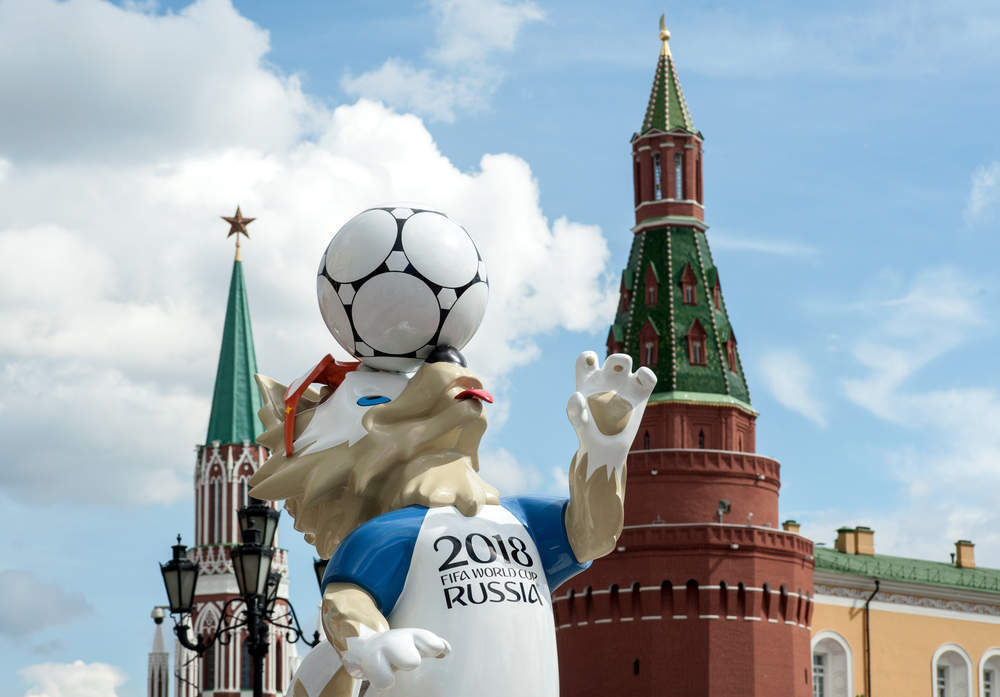
There are exactly 100 days to go until the 2018 World Cup kicks off at Moscow’s 81,000 capacity Luzhniki Stadium.
Russia’s match against Saudi Arabia will get underway at 3pm London time on Tuesday, 14 June, opening the month-long tournament that will come to a close in the same stadium on Sunday, 15 July.
Numerous organisations, players and fans have called on Fifa to strip Russia as the host of football’s most prestigious tournament.
Despite allegations of corruption involving backhand payments to Fifa officials in exchange for World Cup hosting votes, the widespread Russian doping scandal that led to the nation’s ban from the 2018 Winter Olympics and violent clashes involving Russian gangs at the 2016 European Championships in France, Russia 2018 will almost certainly go ahead.
Fifa president Gianni Infantino has insisted that the tournament will be a success:
“Russia is 99% ready to host the World Cup. They are putting the last finishing touches and everyone who is going to Russia will have a fantastic time.”
But is Russia really ready to host this summer’s tournament?
Are the stadiums ready?
Russian President Vladimir Putin stated late last year that some of the venues set to be used during the 2018 World Cup were still under construction.
Some stadiums are already finished, such as those that were used during last summer’s Confederations Cup. However, Russia still needs to complete and test a number of others in the next 100 days. The construction company in charge stated in August 2017 that it was approximately 30 days behind schedule.
Fifa reported in December that five of the 12 stadiums set to be used were ready to welcome fans, while the final touches were being put on the remaining seven stadiums.
As of February, work was still ongoing. However, the nation expects all 12 stadiums to be ready in time for June. The Russian government has set a deadline of 1 April for the completion of construction.
Has Russian football fixed its racist image?
Almost 100 incidents of racism were reported at football stadiums in Moscow alone between 2014 and 2016 according to the city’s human rights commissioner Tatyana Potyayeva.
As Russia struggles to rid Russian football of racism and discrimination, Football organisations and United Nations officials have reportedly voiced concerns about the nation’s efforts (or lack of) to combat the issue ahead of the tournament.
Leading African footballer Yaya Toure stated in 2013 that he could boycott the World Cup after Russian club CSKA Moscow denied claims of racist chanting directed at him during a match.
“If we aren’t confident at the World Cup, coming to Russia, we don’t come.”
Fifa’s anti-racism adviser Tokyo Sexwale reiterated this a year later, telling the Associated Press:
“There is a threat black players will say they are not going to Russia. We can’t have that. I am talking as a Fifa person and a citizen of the world – it can’t go that far. Once these things start and you don’t act as leaders, these things snowball.”
However, Russia has done little to improve its image. As recently a December, 17-year-old Liverpool player Rhian Brewster was subject to racist remarks from Spartak Moscow fans during a Uefa youth match.
With months to go, Russia seems to be making some effort to combat discrimination in stadiums. According to Fifa, stewards and volunteers have been trained to communicate in an acceptable manner when responding to these incidents.
Fifa’s head of sustainability and diversity, Federico Addiechi, said:
“We have been implementing a number of actions, one of them being the diversity training for our staff, volunteers and stewards. They will all be taking care of our spectators, and this specific training will provide them with the necessary tools to contribute to making the event memorable for everyone.”
Is it safe for fans to travel?
Russian fans caused havoc at the 2016 European Championship in France as organised hooligans descended on the country. Attacks from Russian gangs left two fans in comas and plenty more with serious injuries.
Russia’s response was one of little concern. Both Igor Lebedev, the deputy chairman of the Russian parliament and President Vladimir Putin made light of the situation. The latter joked:
“I don’t know how 200 Russian fans could beat several thousand of the British.”
This does not bode well for the 2018 World Cup. There will be more of these fans present and they will be operating in their own territory. Trained gangs have already promised further violence at the World Cup.
Russia did attempted to crack down on fan violence following the European Championship. One of the Russian fans involved in a serious assault on an English fan was arrested upon arrival back in Russia and faced up to 15 years in prison.
Despite continued violent among regional clubs in Russian Premier League games, Fifa has insisted that security measures are in place to ensure that violent clashes do not break out among rival fans during the tournament.







